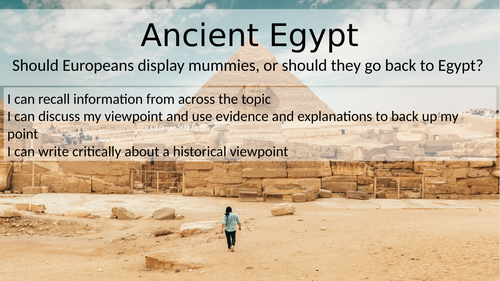


Used with success across Key Stage 2.
Engage in a powerful culminating activity with the final lesson - “Should Europeans Display Mummies in Museums or Should They Be Sent Back to Egypt?” from our comprehensive exploration pack. In this thought-provoking lesson, students will have the opportunity to revisit the initial question posed at the start of the unit and reflect critically on the ethical dilemma. By providing a safe and judgment-free environment, students can freely express their thoughts and opinions, showcasing their learning and critical thinking skills developed throughout the unit.
Key Features of the Final Lesson - Critical Reflection on Mummy Display:
Reflecting on the Unit of Work: Encourage students to reflect on their journey throughout the unit, revisiting the knowledge, insights, and perspectives they have gained. This reflection sets the stage for them to critically analyze the ethical question.
Writing Critically: Create a supportive environment where students feel encouraged to write in a critical and thoughtful manner. Emphasise that there are no right or wrong answers to the ethical question, allowing students the freedom to express their opinions without fear of judgment.
Analysing Multiple Perspectives: Encourage students to consider and incorporate multiple perspectives into their writing. Students should engage with arguments for and against displaying mummies in museums or repatriating them to Egypt, demonstrating their ability to think critically and evaluate diverse viewpoints.
Applying Ethical Frameworks: Guide students in applying ethical frameworks, such as cultural preservation, respect for cultural heritage, and the rights of descendant communities, to their analysis and arguments. This allows them to consider the broader ethical implications and impacts of the decision.
Synthesizing Learning: Challenge students to synthesize their learning from the unit, drawing upon the knowledge, evidence, and critical thinking skills they have acquired. Encourage them to support their arguments with examples, evidence, and logical reasoning.
Celebrating Diverse Perspectives: Foster an atmosphere of respect and appreciation for diverse perspectives. Encourage students to engage in constructive discussion and consider counterarguments, demonstrating empathy and an understanding of the complexity of the issue.
Celebrate the diversity of opinions and encourage students to express their thoughts confidently, knowing that their perspectives are valued and respected. This final lesson serves as a culmination of their learning journey, demonstrating their ability to analyse complex ethical dilemmas with nuance and thoughtfulness.
Something went wrong, please try again later.
This resource hasn't been reviewed yet
To ensure quality for our reviews, only customers who have purchased this resource can review it
Report this resourceto let us know if it violates our terms and conditions.
Our customer service team will review your report and will be in touch.